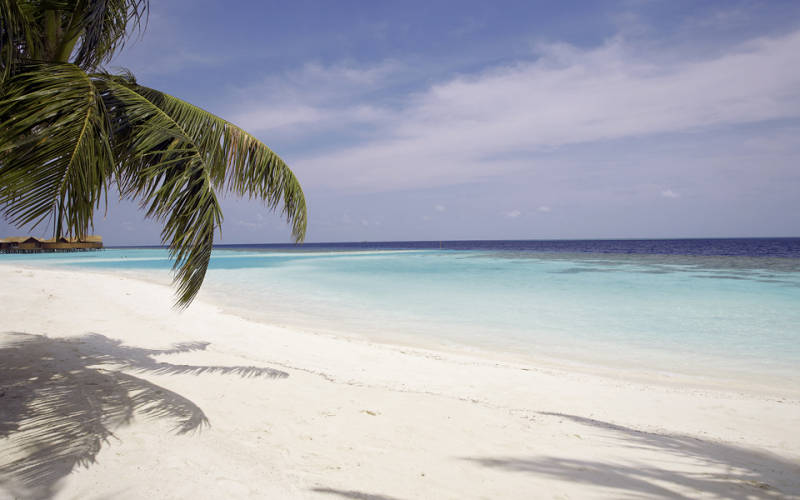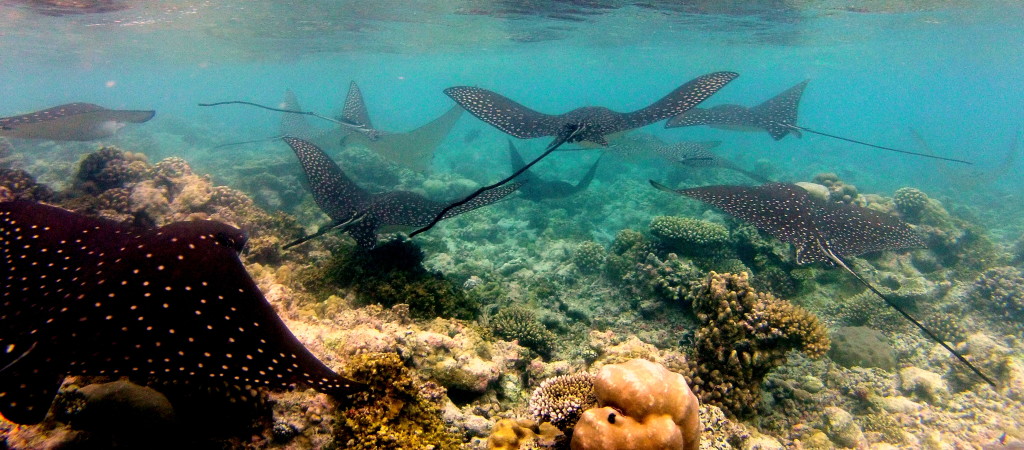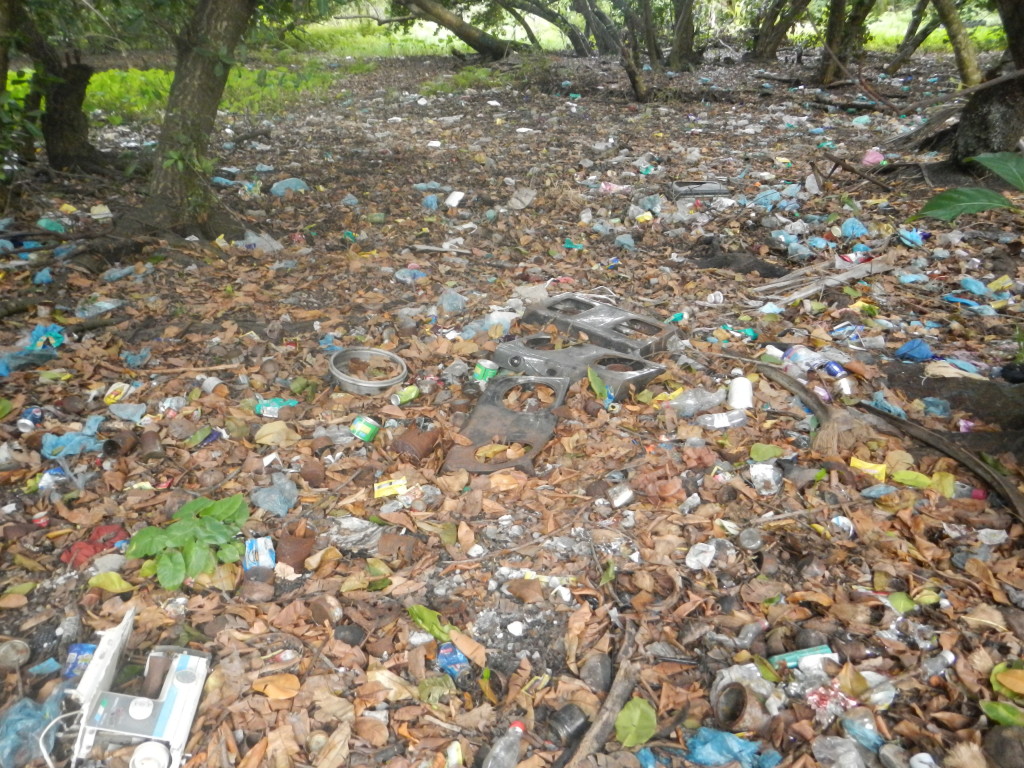Marine Life & Conservation
Marine conservation in the Indian Ocean

Introduced by Jeff Goodman
Each year more people look for exotic destinations to take their holidays and dive trips and so the human impact on these pristine places takes a terrible toll. Reef destruction, over fishing, uncontrolled development, pollution from human waste… the list is almost endless. So who is ultimately responsible? Local government? Tour operators? Resort companies? Tourists? We all tend to pass the buck while at the same time making as much profit as possible before the golden goose eventually gets choked to death. In the Maldives at least, these issues are starting to be being taken seriously.
The Maldives, called “the flower of the Indies” by Marco polo, is suffering today from new developments and an increased population, including tourism, which together with climate change will synergistically impact on the marine environment.
The Maldives constitutes together with the Laccadives the largest and most extensive chain of atolls on the planet with less than 4% of the territory being dry land, so by joining the two most important forces that drive the country together, conservation and tourism, a long term sustainability of the marine environment can be obtained.
This country is the most imminently threatened by rising seas caused by climate change, so the Maldives has to be prepared for climate change as past emissions will increase global temperatures by up to 0.60º C over the next four decades, so not only must our awareness of climate change increase, so must our need to understand the changes it will bring and our vulnerability to it. Other activities practiced in the Maldives such as coral mining, pollution and unregulated fishing are already impacting on the marine environment, so understanding the effects of temperature increase and ocean acidification is of extreme importance.
A country that is no longer relying on their tuna fishery for survival but depend on resort islands and incoming tourists for their livelihoods have to take care of their environment.
Speaking about the tourism in Male, Kuoni’s Head of Corporate Responsibility Matthias Leisinger once said that “tourism is like fire; you can cook with it, but it can also burn your house down.” The tourism industry generates about 30% of the country´s GDP. In 1998 a bleaching event caused almost 100 percent of mortality in some areas of the coral reefs and, compared to other countries where management was working really well, their recovery was much better than in the Maldives. “Incidents like this are likely to increase as stock diminishes everywhere” says another representative from the Ministry of Tourism in the Maldives. He also pointed out new challenges arising with the changing market profile of tourism in the country, since the European visitors do form part of taking care of the natural environment. However, “the market is changing, and the new market is constituted of guests that are walking on the reefs, catching and eating crabs….” “Maybe it is about time for the resorts “to take responsibility for the natural environment for the duration for the lease,” a representative from the Marine Research Centre (MRC) said. Adjustment is essential if the different sectors, including tourism, aim to reduce the vulnerability to climate change and limit its negative sides and so optimizing the resources to the local community to cope with these changes.
The two biggest threats to the Maldives are climate change and waste management.
Climate change and coral reefs resilience
● Coral Reefs in the Maldives
– The Maldives is home to around 60 different coral genera and has the highest coral diversity in the Indian Ocean. Perhaps due to its substratum or erupted lava, the Maldivian reefs appear to be qualitatively different from other shallow reefs in the Indian Ocean in the way that they are composed of branching Acropora in high abundance and diversity. The Maldives also have the highest temperatures of the Indian Ocean.
– The threats the coral reefs are facing in the Maldives are sedimentation and sewage stress from the bigger islands (from the harbors and airport). In addition to this, inappropriate fishing methodologies are increasing and impact the recovery rate of the reef from bleaching events, and together with the global climate change is the biggest threat nowadays. The impact and the long-term possible recovery of reefs are directly related to overall health of coral reefs.
– For local and national managers to be able to act in response to these threats it is therefore of extreme importance to have monitoring protocols.
Monitoring Protocols
A number of protocols have been developed by the Marine Research Center, the Darwin Initiative, and the Great Barrier Marine Park Authority to monitor reef fisheries and coral bleaching in which corals expel the algal cells (zooxanthellae), that under normal conditions live within their tissue. The Maldives has already experienced extensive climate related damage to their reefs, where other reefs recovered better under similar circumstances, therefore an accurate management and understanding of Coral Reef health has to be implemented around the whole country.
Bleach Watch
This protocol has been developed to detect and measure conditions and events of coral bleaching from a wide range of users like dive operators and resort staff, who over time can prepare available, reliable reports. Detecting early signs of mass bleaching events require a wide network of observers over a broad span of territory.
CPC
Counting the coral coverage and the coral diversity across the Maldives over time will provide the national government and resort managers with valuable information which can be used to understand and act in response to observed changes and threats to coral reef around the Maldives.
Reef Fisheries and the Darwin Reef Fish Project
It is important for the Maldives to obtain more knowledge about reef and fisheries in order to develop new management plans to maintain the Coral Reef’s health. The reef fish are important through herb ivory and predation and both overfishing and destructive fishing practices can alter the dynamics of the whole ecosystem. The Darwin Reef Fish Initiative together with the MRC have developed a new resources management plan, where spawning aggregations and fish home range can be detected to elaborate new management plans. The aquarium and bait fishery have guidelines, but there are no regulations for reef fish, apart from the protected Napoleon wrasse and parrotfish species. The reef fishery has to be managed properly to be sustainable and size limitations of reef fish are necessary, so by implementing this monitoring protocol, miss-reporting and under-reporting fish, like the Rainbow runner, is being sampled and measured to apply appropriate managing guidelines and so improve the resilience of the Coral Reefs.
Fish watch
A fish count and underwater visual census; it constitutes a tool to measure fish populations over time and location.
Fish Catch
A survey collecting information on number and weight of landed reef fish. Together with the measured size and the location of fishing, this gives information for developing marine protected areas. Data is also collected from night fishing practiced by guests of the resorts.
Shark Watch
A diver or snorkel-based recording of shark sightings at the dive or snorkel site on a daily basis. Since the sharks were almost depleted from its water or overfished due to their fins, the tourists are now demanding to see sharks, so since 2009 they have introduced shark protection.
Under the climate change trust fund with World Bank funding a new project is being implemented that will train and empower local community to monitor their coral reefs until September 2014.
A monitoring protocol is developing and a database is going to take shape for the entire country. With less than one per cent of the world’s oceans protected from exploitation and an estimation of that up to 80% of the world´s marine protected areas are only so called and not actively managed, it´s of urgent need to create properly managed and protected areas for the marine environment. All benefits of having marine protected areas are well known, such as conservation of the biodiversity and improvements of the local economy; however, it is so important for the future of the country, which is why a stakeholder approach is needed to monitor these areas and, if necessary, protect and preserve them.
Another issue to consider is how close they need to be, in order to promote connectivity between areas, and how many there should be, to provide a real protection for species. To enhance the resilience of the coral reef in the Maldives not only a reduction on pollution is needed, but also protection and managing existing marine areas properly, can work as an insurance for sustainability.
● Developing waste management systems on inhabited islands
– The Maldives is facing one very big human impact and that is waste management. In the shadow of Thilafushi Island, which is the waste island close to Male the capital, the local islands are struggling with waste processing and associated water quality problems. The Maldivian islands are scattered over a very large area, so distance combined with an increase in population and consumption make the waste management issue very important to resolve.
– A pioneer project involving four northern atolls cooperating to manage the waste at just one island is set up to start working in 2014. This will join resort islands and local islands together, and act as a pioneer project to relieve the burden of Thilafushi.
– By promoting this and taking care of waste closer to the islands where it originated, it is probable that less waste will be dumped in the ocean or buried in the sand or burned producing toxic gases.
– So by doing this, not only will the local islands’ reefs get more resilient by alleviating the human impact, but also the resort island will have less waste washed up on their beaches. This is a good example of both locals and tourists benefitting and eventually the entire economy and the environment.
– Money from separate sources will also be implemented in several projects to teach segregation of waste at household level, and bins will be provided to store the waste separately until removal from the island.
– Probably due to the fact that the islands have accumulated waste over time, a big clean up has to be organized to accomplish the objective of waste management.
The Maldives aims for a total protection of their waters and would like to proclaim the entire country a UNESCO biosphere reserve by 2017 and the country as a Marine Reserve by 2020. Let´s see how this amazingly beautiful country threatened by climate change and waste will manage with such big expectations.
Marine Life & Conservation
Shark Trust launches Oceanic 31 Shark Art Auction

 After a two-year tour of UK art galleries, community spaces and aquariums, the Shark Trust’s acclaimed Oceanic31 exhibition takes its final bow at the Royal Geographical Society later this month. And the unique collection of artwork, depicting 31 species of oceanic sharks and rays, donated by 31 artists, is now open for bids from art lovers and shark enthusiasts. The online auction, launched today, will close on the 7th December at 8pm (BST). The money raised will support the Shark Trust Oceanics Programme.
After a two-year tour of UK art galleries, community spaces and aquariums, the Shark Trust’s acclaimed Oceanic31 exhibition takes its final bow at the Royal Geographical Society later this month. And the unique collection of artwork, depicting 31 species of oceanic sharks and rays, donated by 31 artists, is now open for bids from art lovers and shark enthusiasts. The online auction, launched today, will close on the 7th December at 8pm (BST). The money raised will support the Shark Trust Oceanics Programme.
People can now bid on 27 of the artworks by visiting this website:
https://superstars-auctions.com/sharktrustauction
It is a chance to own a beautiful piece of original art and to support the Shark Trust. The timing of the auction also means that these would make a very special Christmas gift for any shark-lover.
- Bigeye Thresher Shark by Janina Rossiter
- Carcharodon carcharias by Jimmy Higgs
- Croc VR 2030 by Tom Mead
- Oceanic Whitetip by ATM
- Silky Street by ScapaJoe
The diversity of pieces mirrors that of the sharks and rays they represent. You can bid on paintings, digital creations, sculptures, mixed media and more. You can pick your favourite artist or species of shark. Or you can select the perfect artwork to make a statement in your home or office. Whichever you choose, you will be supporting the work to protect these amazing animals.
One of the pieces of art has been selected to be auctioned live by Steve Backshall at the For the Love of Sharks event at the Royal Geographical Society in London on the 29th November. In addition to this, two further pieces will be raffled at this event, giving people a chance to win an incredible piece of shark art. For the Love of Sharks is the Shark Trust’s flagship evening. A night to celebrate sharks. Steve Backshall is the headline speaker at this event that will see other prominent shark advocates join him on stage.
Tickets for the event can be snapped up here:
https://thesharktrust.org.uk/Event/flos24
Those that would like to see the Oceanic 31 exhibition have one final chance. It is being displayed at the Pavilion at the Royal Geographic Society from 26th November until the 7th December. Entry is free.
Find out more here:
https://www.rgs.org/events/upcoming-events/oceanic-31
Paul Cox, Shark Trust CEO, Said “This exhibition has given us the opportunity to reach out to a new audience. And inspire more people with the wonderful sharks and rays on which our Big Shark Pledge campaign is based. We are immensely grateful to the 31 artists who have worked so hard to create these works.”
Bid for your favourite Oceanic 31 artwork here:
https://superstars-auctions.com/sharktrustauction
Banner Image: Smooth Hammerhead by Alicia Hayden
Marine Life & Conservation
Meet Steve Backshall in the Bite-Back Prize Draw

Until 28 November, prizes worth a massive £10,000 – including experiences, products and tuition – feature in a line-up of items that can be won for £5 in an online prize draw to celebrate Bite-Back Shark & Marine Conservation’s 20th anniversary and help generate crucial funds for the future.
Top of the list of prizes is the chance to spend time with adventurer and wildlife expert Steve Backshall, a workout session with Nat Geo star Aldo Kane, a kayaking trip alongside white-water expert and diver Sal Montgomery and a Zoom call with ‘shark whisperer’ Cristina Zenato.
On top of that, some of the most admired companies in the diving and scuba industry have been quick to support the charity with fabulous prizes that make the £5 ticket price worth more than just a flutter.
Master Liveaboards, BSAC, Midlands Diving Chamber, Go Freediving and Blue Shark Snorkel have all generously donated experience prizes, while celebrated photographer Alex Mustard has donated a print and artists Scott Gleed and Olivier Leger have donated a sculpture and illustration to help boost the fundraising pot.
Fourth Element has donated Ocean Positive gear and LA watch company Nodus has gifted the charity a stunning dive watch. For land lovers, the charity has included a five star London hotel stay at Bankside Hotel plus a family visit to Longleat Safari Park in the roster of prizes.
Campaign director for Bite-Back, Graham Buckingham, said: “We’ve been overwhelmed with support from companies and individuals that we truly admire and who have supported us on our 20 year journey and we’re truly grateful to them all. While we feel incredibly proud of our achievements over the past two decades – and we are super excited about the next chapter – this prize draw isn’t a vanity project. It represents a real lifeline to our work and important advancements in the global protection of sharks. So we hope divers, dive clubs and even bargain hunters grab some tickets to make this a massive success.”
The charity hopes that the prize draw will generate crucial funds to launch a brand new, ground-breaking, campaign to enrol the public and increase support for the protection of sharks around the world.
To enter the competition visit www.bite-back.com/prizedraw. The prize winners will be announced on 1 December 2024.
-

 News1 month ago
News1 month agoIconic SS United States to become the World’s Largest Artificial Reef
-

 Blogs3 months ago
Blogs3 months agoNovoScuba’s Game-Changing Approach for Dive Store Owners: WE PAY YOU!
-

 News2 months ago
News2 months agoBook Review – 52 Assignments: Underwater Photography
-

 Gear News2 months ago
Gear News2 months agoDYNAMICNORD – New German diving brand enters the British market
-

 News2 months ago
News2 months agoExploring Cenote El Pit: A Diver’s Dream
-

 Gear News2 months ago
Gear News2 months agoTry BARE drysuits (and maybe even win one!) this Friday with Sea & Sea at North West Dive Fest
-

 News3 months ago
News3 months agoComing Soon – 52 Assignments
-

 News3 months ago
News3 months agoSave £200 per person per week at Pole Pole Lodge with Dive Worldwide






















